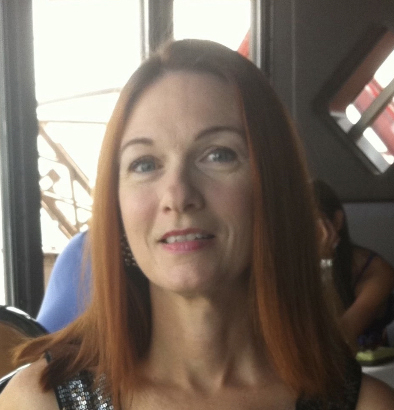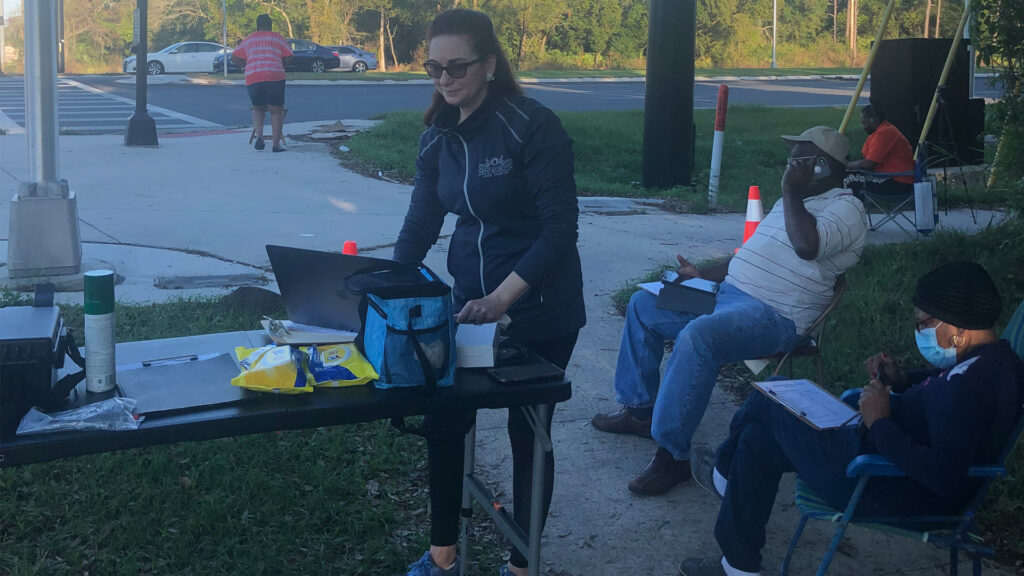By Megan Mascheri, FAU Center for Environmental Studies
The following is a Q&A conducted with Jan Booher, director of the Unitarian Universalist Justice Florida Climate Resilience Ministry since 2016. Booher works with various groups through the ministry, partnering with faith-based groups, nongovernmental organizations and government entities to aid in resilience programs in underserved communities. This interview has been edited for length and clarity.

Could you tell me a little bit about what motivated you to work on climate issues?
I was the mother of a middle schooler who was finding out about climate change. I was a member of the Unitarian Universalist Fellowship of Boca Raton, and during the summer times when the minister was gone, lay leaders from the congregation spoke. One of whom was John Englander, who had written a book called “High Tide on Main Street.”
I was a mom who was raising a kid. I have a master’s degree in biological oceanography, and I had not been paying attention. I had been “mom-ing” and so the two things came together. Having a child who was horrified when she heard about climate change. … She and the children around her … were finding out about climate change (and) were experiencing a variety of grief and anger and all kinds of things, and we really wanted to support them.
How do you think that climate change will affect these children in the future?
I think, well, I’m sorry to be a doom (and) gloom person, but I think it’s going to be very difficult for these children. What we’re seeing now – the climate chaos with climate migrants and with low-income people … and every time that there is a hurricane … the people are displaced, and another set of people is living out of their cars. They’re trying to look normal. They’re sending their kids. They’re doing what they can.
But we’re having more and more of this. … So, I think it’s going to be very, very difficult because the rate at which we’re able to actually reduce the greenhouse gases is nowhere (near) the speed that it needs to be. So, things are very difficult for them. I think it’s very important for all these generations to have sets of skills (and) to be able to help others to help themselves.
How do you think climate issues impact your specific area?
Okay, so I’m working on this issue internationally, nationally and statewide. And then I’m working with people who are in central Florida itself. … Because I work with a lot of different groups, many of them are faith groups and many of them are CBOs (Community–Based Organizations). And so, what we see is it’s not just the problem of climate change. It is: Where are the people going that are doing climate migration?
And there are real problems that are societal problems that this group of climate migrants has and … it’s a big challenge for them to get moving. And of course, as with anybody who’s coming from another culture where they have received … all of their credentials, when they arrive, they’re unable to get something at the level they were (at) whence they came.
So, a lot of a lot of the problem is being able to get re-established in some way. The other piece of things is about working with people on disaster resilience because … the biggest enemy of resilience is lack of social cohesion. And so, we have to act at every moment when we are with people to help build that social cohesion. To help heal what the things are that separate people … with resources or knowledge that, if put together, could be very helpful.
What kind of tradeoffs or compromises, if any, do you think that there will need to be in order to address climate change?

There are compromises that are made in every construct that we pull together. So, for example, if we’re pulling together 15 entities, we’re pulling together 10 churches that want to be clean energy hubs and they want to have a work force initiative. They want to have certain equipment that they can use for that workforce initiative.
And we are partnering them with workforce people and labor and we’re reaching into their local government, and because it’s health related, we’re working with public health and so forth and so on. And so, the compromises that take place have to deal with who can receive money. Who is eligible to get it? And there’s always a huge compromise about how we are going to construct this thing. First off who’s willing to be in it, and then once they’re in it, what role and responsibilities they’re going to have. And the longer they work together, the better it is. These collaborative problem-solving groups that are multi sectoral are brilliant at making compromises.
That’s one of the markers of it, you know, because people come together and the reasons for that (are) two main things. …The ability to align mission is one, and the other thing is the ability to accept a common set of facts. And so, people who are data oriented and data driven and are looking at the same secondary data and then they look at their own primary data and they have people in the room from the local university … from the government, … from the faith group, and know those are not separated events.
What do you think the average person can or should – either daily or in general – what can they do about climate change?
I think it is kind of like the exercise question. What’s the best exercise? The one you’ll do. And it’s the same. It’s the same with climate change. … It’s about thought leadership and it is about sharing messages and getting people to understand the general construct and to be able to understand that we are all connected and that anything that is done by one person magnified by a large population affects us all.
So, I do think that there is there has been a lot of really good work about what individuals can do. … I mean, of course, everybody who is working in a faith construct that gets together, there is denominational action, there is congregational action and there’s individual action. And the individual action items are always things that we’re accustomed to thinking of having to do with sustainability.
But when we start talking about congregational activity more and more and many of the groups that I am working with are from the Black church, it’s coming out sounding like this: We cannot have a theology where we come in on Sunday and we minister to people, and everybody has a great experience and everybody goes home, if they are going home to hell. And so, we have to do our job to change what happens when people leave.
This Q&A was conducted by Megan Mascheri, a graduate research assistant at Florida Atlantic University who is pursuing a master’s degree in its geosciences program. She has worked as a research assistant for FAU’s Center for Environmental Studies since 2021. The center manages and funds The Invading Sea.
Sign up for The Invading Sea newsletter by visiting here.



